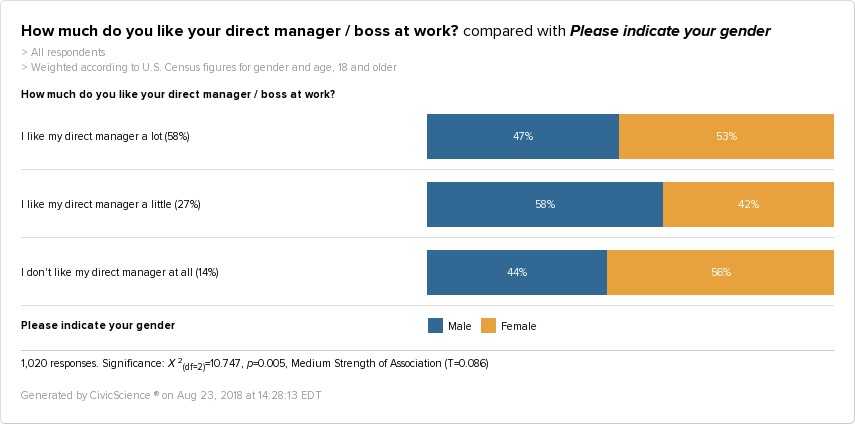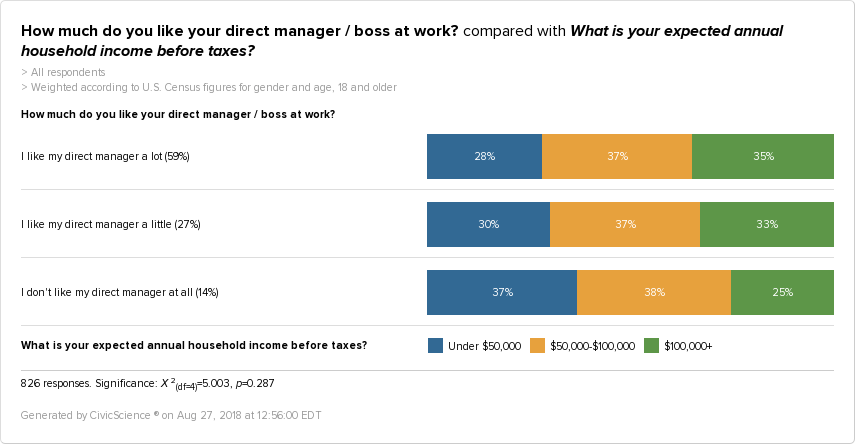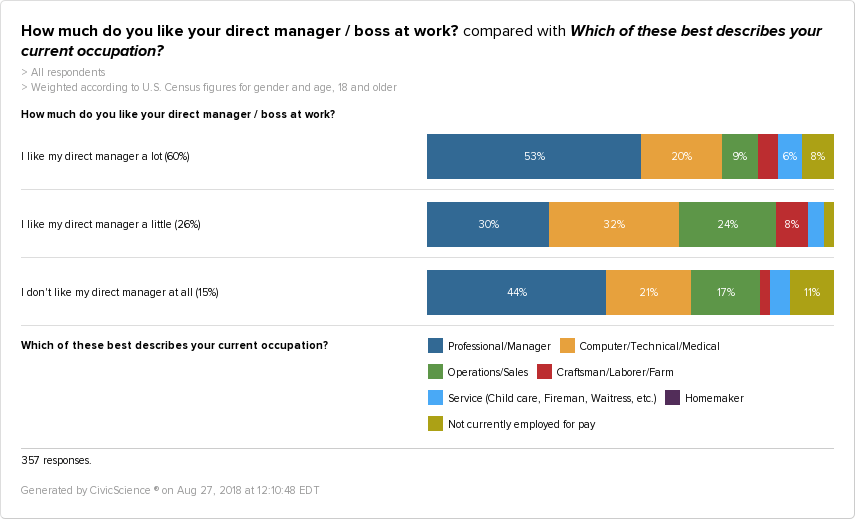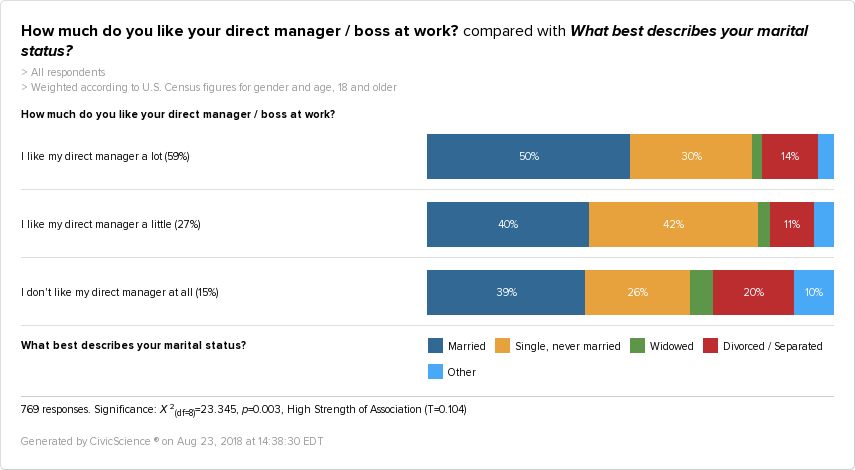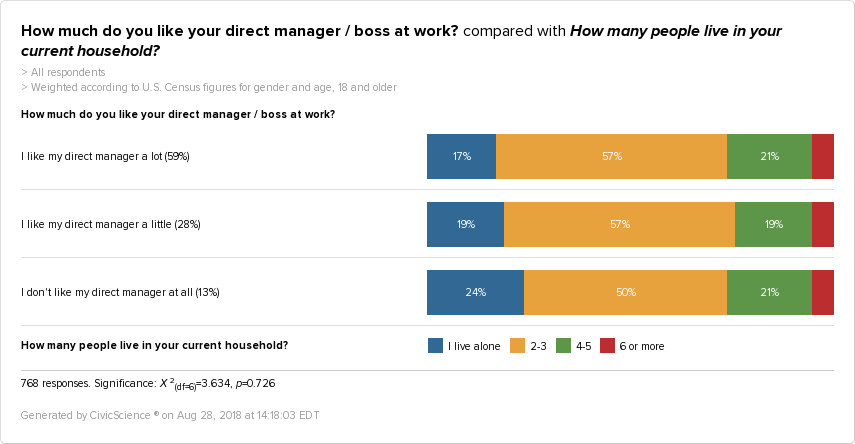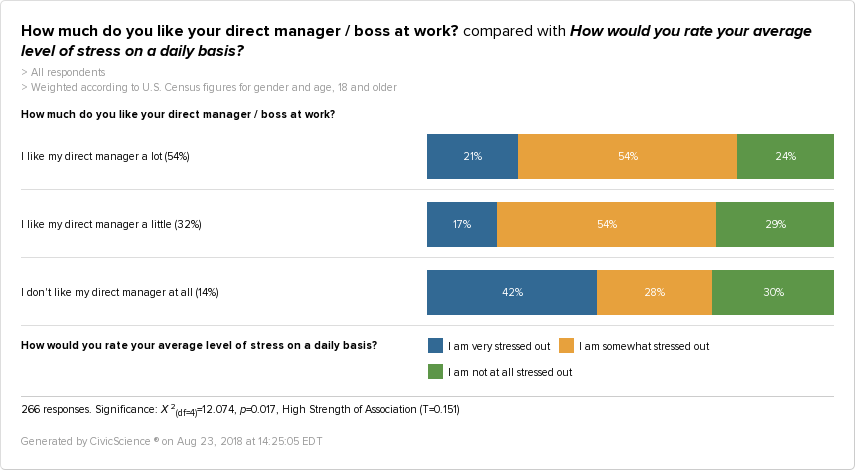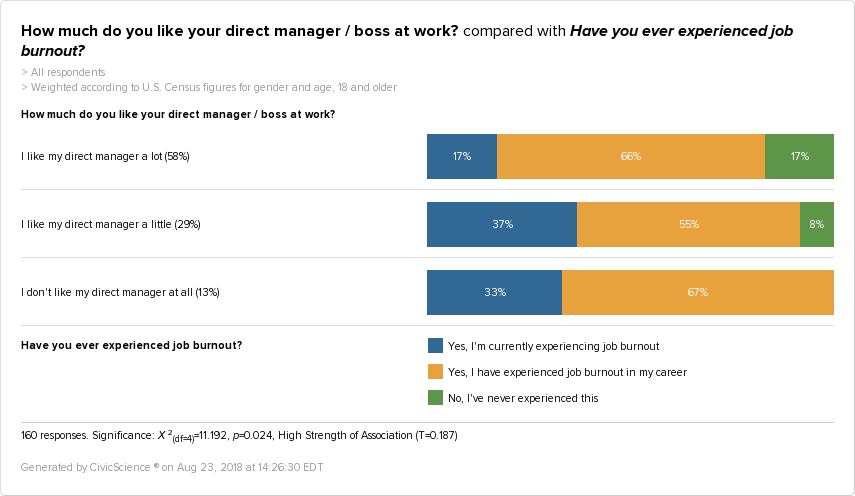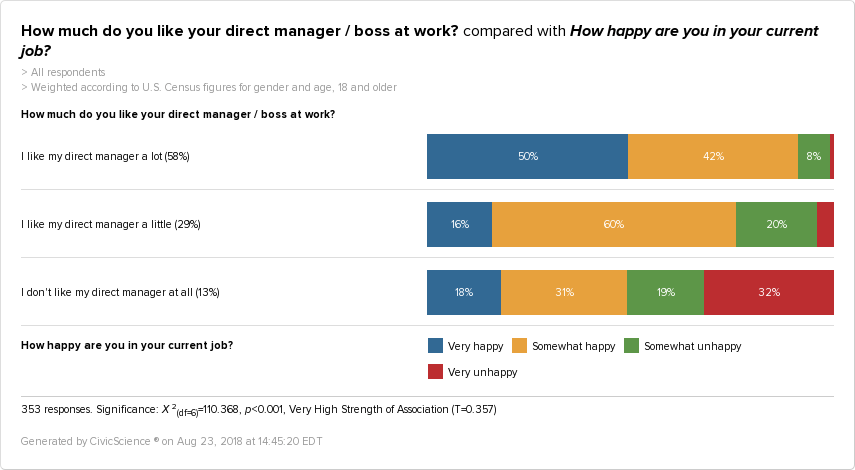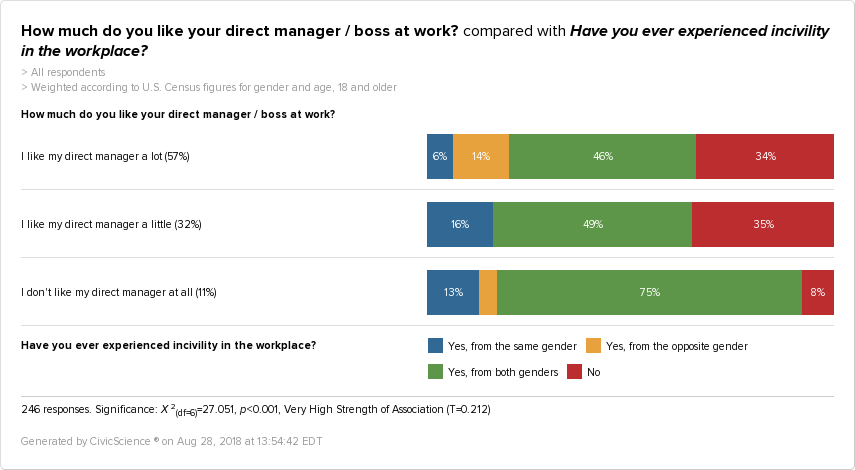With the majority of Americans spending at least 40 hours a week at work, the environment in the office matters. Last month, CivicScience discovered that 64% of U.S. adults have experienced some kind of unkindness in the workplace. However, coworkers are only half the battle. Recently, CivicScience asked just over 1,000 U.S. adults how they feel about their direct manager or boss.
58% of respondents report liking their direct manager a lot. However, a strong 27% only like their direct manager a little, while 14% do not like their direct manager at all.
As the data reveals, women are more polarized on this subject than men. While 53% of those who like their boss a lot are women and women make up 56% of those who do not like their boss at all, men hover in between, making up 58% of those liking their boss a little.
While the numbers do not show huge differences between the genders, they do pose an interesting question as to what causes women to be more decisive when it comes to how they feel about their direct managers.
Although gender could be a factor in who likes their boss, age does not seem to play as large of a role. Baby Boomers are more likely to dislike their managers, but in general, opinions remain relatively consistent.
While the dislike of a manager could increase with age, it may also correlate to income. Those who earn less than $100,000 a year are much more likely to dislike their boss than those in the upper echelons of earnings.
Given the fact that only 28% of those who like their direct manager are low-income earners while making up 37% who disliked their boss, the data highlights a potential point of tension between those who earn less and those who earn more.
Depending on the occupation, the role of the boss or direct manager can vary. And as the occupation varies, so does the approval rating of higher-ups. Those with professional or managerial roles are more likely to like their manager a lot. Those in computer, technical or medical fields as well as those in sales, on the other hand, tend to like their direct managers only a little.
There are a variety of reasons that occupation and boss favorability could be connected. After all, each job and business may have a different hierarchy and a different way in which direct managers interact with their subordinates, setting the tone for the work environment.
Occupation aside, it seems that liking one’s boss could be one element of an individual’s larger approach to relationships. 50% of those who say they like their direct manager a lot are married. However, 20% (the largest percentage in that category) of those who do not like their direct manager at all are divorced and separated individuals.
While the relationship between spouses differs from the relationship between employee and direct manager, both are still highly involved and sustained interactions that may occupy a great deal of time and emotional energy. Could it be that those who like their boss have found a way to make these kinds of intense, personal relationships work for the long-term? Do those who are divorced simply dislike communication and compromise? The answer is never as simple as that.
However, those who live alone are the most likely to say they dislike their boss.
While living with others does not necessarily mean that you get along with them, it does require that everyone work towards at least a tolerable coexistence–similar, in some ways, to the dynamic at work. Those who live alone, simply do not have that same experience in their personal lives, on a day-to-day basis.
If the quality of a relationship can impact stress levels, then the first assumption may be that liking one’s boss is the key to low stress. However, the data paints a different picture. Although 42% of those who do not like their boss are very stressed out, even those who do like their boss indicate regular stress. 21% of people, in fact, who think favorably of their boss, consider themselves very stressed out on a daily basis.
That said, those who only like their boss a little are currently experiencing more job burnout than anyone else–even those who do not like their boss at all.
Have those who dislike their direct managers simply detached themselves from the situation, thus resulting in lower rates of job burnout? Are those who like their boss a little stuck in a back and forth between wanting to do well, but feeling uninspired to impress their superiors?
There are many potential explanations for this trend. However, given the fact that the largest percentage of people who have never experienced job burnout also like their direct manager a lot, it is not difficult to see how leadership at work can make or break the atmosphere.
That said, just because you don’t like your boss, doesn’t mean you can’t like your job. Among those who do not like their current direct manager, being somewhat happy and being very unhappy on the job are almost equally as common. The largest percentage of somewhat happy workers tend to like their direct manager or boss a little.
These more neutral workers are also more likely to use up all of their vacation days, with 71% of those who like their boss a little planning to be out of office as much as possible this year.
Could it be that a sense of greater neutrality places less pressure on workers to be in the office all of the time? Do employees with more neutral feelings towards their superiors place less focus on their professional relationships, prioritizing personal time instead? Or perhaps people feel the need to get away from the entire work environment, not just the relationship they have with their boss.
Incivility in the workplace takes many forms. Those who like their direct manager a little are the most likely to experience this unkindness from the same gender. Those who like their direct manager a lot tend to experience incivility from the opposite gender more than those in the other two groups, while those who do not like their direct manager at all say the negativity comes from all sides.
As for those who do not experience workplace incivility? Those who like their direct manager a little slightly out-rank those who like their direct manager a lot.
Suffice it to say, work relationships are complicated, and whether your boss is the same gender as you or not, tensions may flare. Although liking a boss or direct manager may, on the surface, seem to make life easier, it’s important to note that sometimes neutrality in the workplace may offer greater peace of mind.

